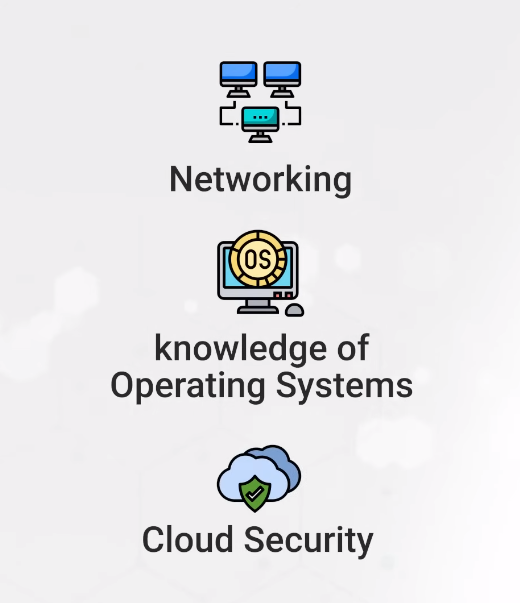Introduction
Why data security is an in-demand field?

Data security is an in-demand field for several reasons. As businesses have become increasingly reliant on technology and data storage, the risk of cyber-attacks has also grown. This means that companies are looking for experts who can help them protect their sensitive information from breaches and theft.
With the rise of regulations such as GDPR and CCPA, there is a greater need for professionals who understand how to handle customer data in compliance with these laws. Failure to do so can result in significant fines and legal repercussions.
The Various Career Paths Available In Data Security

In the world of data security, there are many different career paths to choose from. One option is to become a security analyst, which involves monitoring networks and systems for suspicious activity and responding to threats. Another path is to become a penetration tester, where you would attempt to hack into systems in order to identify vulnerabilities that need fixing.
Another potential career path in data security is as a cryptographer. Cryptographers specialize in creating and breaking codes, which can be used both for protecting sensitive information and for decrypting it when needed. Other possible roles include incident responders, who are responsible for managing the response to cyberattacks; forensic analysts, who investigate digital evidence related to cybercrime; and security consultants, who advise organizations on best practices for securing their systems and data.
The Skills And Qualifications Needed To Excel In This Field
A solid foundation in computer science is required as it is necessary to understand the technologies involved in data security. Knowledge of programming languages such as Python and Java is also essential.
Furthermore, excellent analytical skills are crucial for identifying and assessing potential security threats. The ability to think critically and make quick decisions under pressure is also important when dealing with security breaches.
In addition to technical skills, strong communication skills are needed to effectively communicate with team members, clients, and stakeholders. Relevant certifications such as Certified Information Systems Security Professional (CISSP) and Certified Ethical Hacker (CEH) can give candidates an edge over others applying for similar positions within the industry.
The Benefits Of A Career In Data Security

One key benefit is job security, as businesses and organizations are constantly looking to protect their sensitive information from cyber threats. This means that professionals who specialize in data security can expect to have stable employment prospects for years to come.
Another benefit of a career in data security is the potential for high salaries. Given the high stakes involved in protecting valuable information, companies are willing to pay top dollar for skilled professionals who can keep their networks secure. Additionally, many data security jobs offer flexible working arrangements, allowing professionals to work remotely or on a flexible schedule.
Working in data security allows individuals to make a meaningful impact on society by protecting people’s personal and financial information from theft and fraud. As cybercrime becomes increasingly prevalent, those working in this field can take pride in knowing that they are at the forefront of preventing these attacks and safeguarding others’ privacy.
Preparing For A Career In Data Security
Identifying Your Career Goals And Objectives
As you embark on your journey toward landing a data security job, it is crucial to identify your career goals and objectives. This will enable you to establish a clear path to success in this field. Begin by asking yourself what kind of role you envision for yourself within the realm of data security. Is there a particular area that interests you most? Perhaps you are passionate about network security or cryptography, or maybe compliance and risk management are more up your alley.
Education And Certification Requirements
A bachelor’s degree in computer science or a related field is often preferred, but it may not always be required. However, obtaining relevant certifications can significantly increase your chances of being hired for these types of roles. Some popular certifications in the data security field include Certified Information Systems Security Professional (CISSP) and Certified Ethical Hacker (CEH).
In addition to formal education and certifications, having hands-on experience with different security tools and technologies can also make you a more attractive candidate for data security jobs. This could include experience with firewalls, intrusion detection systems, anti-virus software, and vulnerability scanners. Many employers also value candidates who are familiar with compliance regulations such as HIPAA or PCI-DSS.
It’s worth noting that the specific education and certification requirements for data security jobs will vary depending on the employer and the role itself. That’s why it’s important to carefully review job postings to determine what qualifications are required or preferred before applying.
Gaining Practical Experience Through Internships And Entry-Level Positions
One of the most effective ways to gain practical experience in data security is through internships and entry-level positions. This allows individuals to get hands-on experience in the field, work alongside professionals, and learn about industry-standard tools and practices. These opportunities will also allow individuals to build strong networks that can be leveraged later on in their careers.
Internships provide an opportunity for students or recent graduates to gain experience while still studying or shortly after finishing their degree. Many companies offer internships with a structured program designed to teach interns about different aspects of data security, such as analyzing threats or implementing security measures. Entry-level positions offer similar benefits but typically require a higher level of responsibility than internships.
Building A Network Of Contacts In The Field
Networking allows you to learn about job opportunities, gain insights into various companies and their cultures, and build relationships with potential employers. One way to start building your network is by attending industry events and conferences. This will give you the opportunity to meet people who are already working in the field, as well as experts who can provide valuable information on hiring trends and upcoming projects.
Joining groups related to data security will also allow you to connect with other professionals in the field and stay up-to-date on industry news. You can also use LinkedIn’s search function to find people who work at companies that interest you or who have job titles that match your career goals. Once you identify these individuals, reach out with a personalized message explaining why you’re interested in connecting.
Developing Critical Skills
Technical Skills Necessary For Data Security Professionals
You must have a strong understanding of operating systems such as Windows and Linux. You should know how to configure and secure these systems to prevent unauthorized access. Proficiency in programming languages such as Python or Java is necessary to automate processes like vulnerability testing or log analysis. Knowledge of networking protocols like TCP/IP and DNS is essential to manage firewalls and detecting intrusions.
Non-Technical Skills That Can Make A Difference In Your Career
Non-technical skills can also greatly impact your career success in this field. For example, having strong communication skills is essential for effectively conveying complex security concepts to non-technical stakeholders such as executives or clients. Additionally, being a good listener and collaborator can help you build trust with colleagues and foster a positive team dynamic.
Another crucial non-technical skill in data security is attention to detail. In an industry where even minor errors can have major consequences, it’s important to be diligent and thorough in all aspects of your work. This includes everything from carefully reviewing code before deployment to ensuring that all necessary compliance regulations are being met.
Finding Opportunities In Data Security
Job Search Strategies And Techniques
- Networking: Networking is one of the most effective job search strategies in the data security industry. Attend conferences, join professional organizations, connect with professionals on LinkedIn and other social media platforms, and engage in online discussions to widen your personal network.
- Tailoring your resume and cover letter: Since data security requires specific technical skills, it is essential to tailor your resume and cover letter for each job application. Highlight relevant experience and qualifications that meet the requirements of the position you are applying for.
- Building a strong online presence: In today’s digital age, having a strong online presence can help increase visibility and attract potential employers. Create a professional website or blog related to data security topics that interest you or showcase work samples such as coding projects or whitepapers you’ve written.
- Developing practical skills: Data security is an ever-evolving field that demands constant learning and development of new skills; develop practical skills by volunteering for non-profit organizations or taking courses related to data protection, encryption techniques, cybersecurity protocols, etc., which will improve your chances of landing a job in this field.
Tips For Creating A Standout Resume And Cover Letter
When crafting your resume, focus on conveying your unique skills and experiences in a clear and concise manner. Start with a strong summary or objective statement that highlights what makes you special, followed by bullet points that demonstrate specific achievements or qualifications. Use keywords from the job description to help tailor your resume for the specific position.
Your cover letter should also be tailored specifically for each job application. Avoid generic templates – instead, research the company and position you’re applying for and address their needs directly in your letter. Highlight how your skills match the requirements of the job posting while also showcasing your personality and passion for data security.
Preparing For Job Interviews

Researching the company you will be interviewing with is a crucial step in preparing for job interviews. It not only shows that you are interested, but it also helps you understand the company’s values and culture. This information can help you tailor your answers to better align with what they are looking for in a candidate.
It is also important to rehearse answering common interview questions. You don’t want to sound scripted, but having an idea of how you will respond can help calm nerves and ensure that you convey your qualifications effectively.
Dressing appropriately and arriving early can make a great impression on potential employers. Dressing professionally shows that you take the opportunity seriously and arriving early gives you time to compose yourself before the interview begins.
Securing Your First Job In Data Security
Salary Negotiation Tips And Techniques
Look at industry standards and the average pay for similar positions in your area. This will give you an idea of what to expect and what is reasonable to ask for. Also, consider the company’s budget and compensation structure.
When discussing salary with a potential employer, focus on the value you bring to the table. Highlight your skills and experience that make you an asset to their team. Additionally, be confident but also flexible in your negotiations. Consider other benefits besides just salary such as bonuses, stock options, or additional vacation time.
Always be prepared with backup strategies if negotiations don’t go as planned or if they are unwilling to budge on certain aspects of compensation. Remember that salary discussions are a two-way conversation and compromise may need to be made on both sides in order to reach an agreement that works for everyone involved.
Navigating Your First Few Months On The Job
Take time to learn as much as possible about your company and its culture. Observe how things are done and ask questions when necessary. Also, take advantage of training opportunities offered by your employer. This will help you understand the company’s processes and procedures.
Get to know your team members and build relationships with them. Networking is important in any industry, but it’s essential in data security because teamwork is critical for success.
Be prepared to face challenges along the way. Data security is a constantly evolving industry with new threats emerging all the time. However, don’t let this discourage you from pursuing a career in this field. Embrace learning opportunities and stay up-to-date with the latest trends through professional development courses or attending conferences/webinars relevant to your work area; this will help you grow professionally while contributing value to your organization at large.
Staying Ahead In Data Security
Keeping Up With Emerging Trends And Technologies
With rapid advancements in technology, it’s important to stay updated on the latest developments and tools that can help protect sensitive information from cyber threats.
One of the most significant trends in data security is the rise of cloud computing. Cloud-based platforms offer enhanced scalability, flexibility, and cost-effectiveness compared to traditional on-premise solutions. Furthermore, artificial intelligence (AI) and machine learning (ML) technologies are being widely adopted by companies to automate security processes such as threat detection and response.
Another trend worth keeping an eye on is the growing importance of data privacy regulations like GDPR and CCPA. Compliance with these regulations requires a deep understanding of data protection laws, as well as technical skills that enable effective implementation of privacy measures. Thus, staying informed about regulatory updates will be critical for anyone aiming to secure a role in this field.
Continuing Education Opportunities And Resources
Platforms like Coursera and Udemy offer a wide range of courses related to data security, including topics such as network security, ethical hacking, and cryptography. Another great source of continuing education is attending industry conferences and networking events. These events provide opportunities to learn from experts in the field, connect with peers, and stay up-to-date on industry trends. Attendees can also gain insight into potential job openings at companies within the industry.
Mentoring And Coaching To Help You Succeed
With the vast array of skills required, having guidance from someone who has already navigated the industry can provide invaluable insight that helps you stand out as a candidate. Mentors can share their experiences and knowledge, providing guidance on navigating different career paths within data security.
Coaches, on the other hand, can help with specific skill development and goal setting. They can help identify areas where you may need improvement and develop strategies to build upon those skills. Additionally, coaches can provide accountability by establishing deadlines for achieving goals or completing certain tasks.
FAQs
What Are The Main Skills Needed To Work In Data Security?
A career in data security requires a combination of technical expertise, effective communication skills, attention to detail, and analytical abilities — all crucial elements that make up the perfect candidate who will protect organizations from ever-evolving cyber threats while keeping sensitive information safe from unauthorized access or exposure.
How Much Can I Expect To Earn In A Data Security Job?
According to Glassdoor, the average salary for a data security analyst in the United States is around $76,000 per year. However, this can vary greatly depending on factors such as location, experience level, and industry.
For example, data security professionals working in major tech hubs like San Francisco or New York City can expect higher salaries than those working in smaller cities or rural areas. Additionally, those with more experience and advanced certifications may command higher salaries.
What Are The Biggest Challenges Facing The Data Security Industry?
One of the biggest challenges facing the data security industry is the continuous evolution of cyber threats. As technology advances, cybercriminals also become more sophisticated in their methods, making it difficult for companies to keep up with the ever-changing landscape. Organizations must invest in updated security measures and stay vigilant to protect against new threats.
Another challenge is the shortage of skilled professionals in the field. With the increased demand for data security services, there has been a rise in job openings but a limited pool of qualified candidates to fill them. This talent gap can lead to higher salaries and benefits for those who do possess specialized skills, making it even harder for companies to recruit and retain qualified cybersecurity personnel.
Regulatory compliance poses another significant challenge for the data security industry. Companies must comply with regulations such as GDPR or HIPAA, which can lead to legal consequences if not followed correctly. Staying up-to-date on changes in regulations while balancing business objectives can be a challenging task for organizations and requires constant attention from data security professionals.
How Hard Is A Data Security Job?
Data security jobs are not for the faint of heart. They require a unique set of skills and knowledge to effectively safeguard sensitive data from cyber threats. Professionals in this field must have a deep understanding of various security technologies, protocols, and best practices to ensure that data is secure.
Conclusion
Landing a job in data security may seem daunting at first, but with the right mindset and approach, it is entirely possible. It’s crucial to have a deep understanding of the industry and the specific skills required for the role you are targeting. Keep in mind that cybersecurity is an ever-evolving field, so staying up-to-date with current trends and technologies will set you apart from other candidates.
Networking is also essential when it comes to finding job opportunities within the data security field. Attend conferences and events to meet like-minded individuals and industry professionals who can provide valuable insights into their experiences working in this field. Additionally, consider obtaining certifications such as CompTIA Security+, Certified Information Systems Security Professional (CISSP), or Certified Ethical Hacker (CEH) to strengthen your resume.
